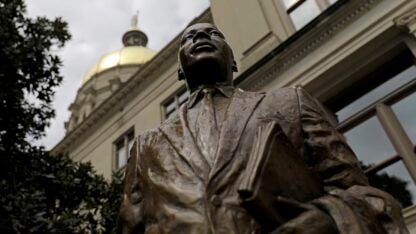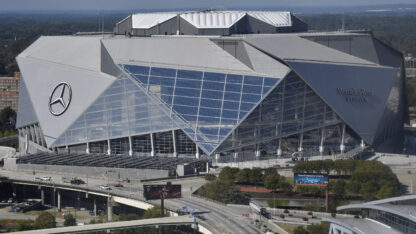WABE sent questions about environmental issues to all of the mayoral candidates. The questions cover climate change and extreme heat, water resources, park maintenance, the tree ordinance and lead contamination in West Atlanta neighborhoods.
The questions are in bold, and Kasim Reed‘s answers follow. Answers were edited for clarity and content.
Read answers from other candidates.
The U.S. Environmental Protection Agency recently expanded the area in English Avenue and Vine City where properties may need to have their soil completely removed and replaced, after finding dangerous levels of lead in people’s yards.
What role do you think the City of Atlanta should have in engaging with the community, and what is your plan to address this potential children’s health issue in West Atlanta neighborhoods?
If this finding is accurate and true, the City should begin working with our two U.S. Senators and congressional delegation to launch a massive remediation effort right away. The mayor will organize these efforts to ensure that the contamination in question is cured in its entirety.
While Atlanta has some big, beautiful new parks opening now and coming soon, many city parks need maintenance. According to the Park Department’s long-term planning program, Atlantans said the number one thing discouraging them from using their parks was that they were not well maintained.
How would you ensure that parks — whether they’re new or old, big or small, regardless of the neighborhood — get adequate funding and maintenance? And how would you involve communities in decisions about their parks?
If elected, Mayor Reed will double down on funding for parks. To do this, he will use public-private partnerships, including working with “friends of” groups and conservancies to raise additional funds. He will also change parks maintenance from seasonal staffing (April to October) to a year-round schedule. He will continue to have dedicated funding specific to park acquisition and maintenance.
Atlanta is losing its tree canopy, and the city has taken years to finish a promised re-write of the tree protection ordinance.
How would you make sure the ordinance update is completed, and ensure that it is enforced?
As evidenced by the stalled Tree Ordinance reform legislation, this issue is complicated. At the basic level, the city’s tree ordinance ought to minimize the number of healthy trees destroyed and ensure that new trees continue to be planted. Developers who clear cut lots or parcels should be prevented from that kind of reckless disregard for the city’s tree canopy. At the same time, developers and homeowners should have a clear, streamlined process.
Reed answered the following three questions on heat, climate change, and water in one answer, below.
Atlanta is hot and getting hotter. Often the hottest neighborhoods are in vulnerable communities of color. Atlanta also has many households with high energy burdens that pay a high proportion of their income to energy bills. Not everyone can afford to run the air conditioner all summer or afford efficiency upgrades to keep their homes cooler — and heat can be dangerous. What role do you see for the mayor’s office in addressing the health risks of extreme heat?
To address climate change, the City of Atlanta prepared a climate action plan in 2015 on how to cut emissions. The city also made a commitment to achieve 100% clean energy by 2035. But progress towards that goal has been slow. What, if anything, would you do to keep Atlanta moving towards emissions reductions? And how would you prepare Atlanta communities to weather the effects of climate change, which include extreme heat, increased flooding, mosquito-borne disease and worsening air quality?
Georgia won a major legal victory in the water wars in the U.S. Supreme Court earlier this year, but there is still another case ongoing. And, Florida, Georgia and Alabama have not found a resolution between themselves. Metro Atlanta is subjected to both floods and droughts — both of which climate change will likely worsen — and we must share our limited water supply within the region and with downstream neighbors. As the mayor of Atlanta, how would you see your role in addressing and preparing for the region’s water challenges?
Mayor Reed will re-energize the Office of Resilience and move with urgency on the recommendations in the Resilient Atlanta report.
The city will also need to build on the initial steps Mayor Reed’s administration took to reduce the size of its gas-powered vehicle fleet. Reed is proud of the 120 EV charging parking spaces that were installed at Hartsfield-Jackson Atlanta International Airport under his administration, but there’s more to do. Reed also invested in flood mitigation projects throughout the city — Memorial Park in Buckhead, permeable pavers throughout Peoplestown, stormwater detention and parks projects in the Old Fourth Ward, English Avenue at Cook Park, and Proctor Creek among others. Perhaps most significantly for Atlanta’s future sustainability and resilience, he led the effort that invested $321 million dollars into creating the Bellwood Quarry Reservoir that recently opened as Westside Park, Atlanta’s largest park. This massive infrastructure project allows water from the Chattahoochee River to be channeled to the quarry site providing Atlanta a 30-day supply of drinking water.
Under my leadership, the City of Atlanta emerged as a national and international leader in sustainability. We can pick the mantle up and continue our forward progress.
Read answers from other candidates.








